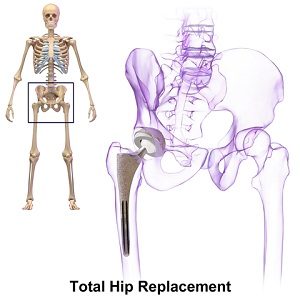What is revision total hip replacementRevision Total Hip Replacement is an orthopedic procedure in which the artificial hip prosthesis that has worn out or been damaged is replaced or repaired. Total Hip Replacement is one of the most common and successful joint replacement procedures with excellent clinical results. But over time the artificial prosthetic implant can fail due to several reasons, and a second surgery is required to correct the complication and restore the hip movement again.

In this hip replacement reoperation, either the small parts or the whole artificial prosthetic is removed and replaced with a new one. Revision surgery is more complex and longer than primary hip replacement surgery. But the aim of revision hip replacement procedure is similar to the original surgery - to improve the quality of life by relieving pain and restoring the motion. In most cases, specialized implants are used for revision hip replacement as damage to bone and soft tissue around the hip may make it difficult to use standard hip implants that are used in primary surgery.
Why is it needed?
Artificial hip joint implants do not last forever and the typical life of an artificial prosthetic for hip replacement is 10-15 years. The lifespan of the implant varies depending on the daily activities of the patient and the amount of stress that is put on the joint.
The most common reasons for this procedure are:
Wear out or loosening of the artificial prosthetic
The prosthetic implants move over each other and, over time, the implant can wear out with regular use of the artificial hip joint. Especially, in the case of younger patients, they have higher chances of loosening or wear out of the prosthetic implant as they might outlive the life expectancy of the implant. High impact activities and an active lifestyle also increase this risk of wearing out of the implant. This can cause small particles to break off and accumulate around the hip joint. The body’s immune system recognizes them as foreign and attacks these particles as well as the healthy bones. This leads to deterioration of the bone and this condition is known as osteolysis.
This is more common when metal-on-metal implants are used, i.e. both the ball and socket parts are made of metal. In some cases, patients can be sensitive to the metal ions in the broken particles and can cause damage to the bone and soft tissues of the hip and this might result in the need for revision surgery.
Implants made of plastic have shown less wear out and therefore chances of development of osteolysis are also less.
Repetitive dislocation of the implant
Trauma or injury to hip can cause the ball to dislodge from the socket of the hip joint. This is known as hip dislocation and recurrent dislocation might lead to the need for revision hip replacement for better alignment of the implant. However, dislocation of the hip implant is not a frequent condition, and hip revision can be an effective procedure in preventing dislocation.
Damage due to infection
Infection is a possible complication of total hip replacement surgery. In the infection bacteria attaches on and around the surface of the prosthetic implant, causing hip pain and fever.
Infection can occur anytime after the surgery, while you are in the hospital or after you go home. The risk is usually higher during the first six weeks. Bacteria can enter into the bloodstream form infections unrelated to the hip – an infection in the mouth, gums, or teeth or the lungs, urine, or skin.
If the implant from the total hip replacement becomes infected, there are chances that the implant begins to loosen from the attachment to the bone. Hip Revision surgery is necessary at times as bacteria cannot be easily eliminated from a joint replacement with antibiotics alone.
Different kinds of revision surgery are available for infection. The surgeon will discuss each type of surgery with you. The factors that determine which surgery is best for you are:
-
Type of bacteria that has caused infection and sensitivity to antibiotics
-
The duration and severity of the infection
-
Health status of the patient
-
Personal preference for a specific treatment option
The possible treatment options are:
Surgical cleaning or debridement
Staged surgery: Involves completely replacing the primary prosthetic implant with the new ones. It can be done in as a single operation or in two stages.
|